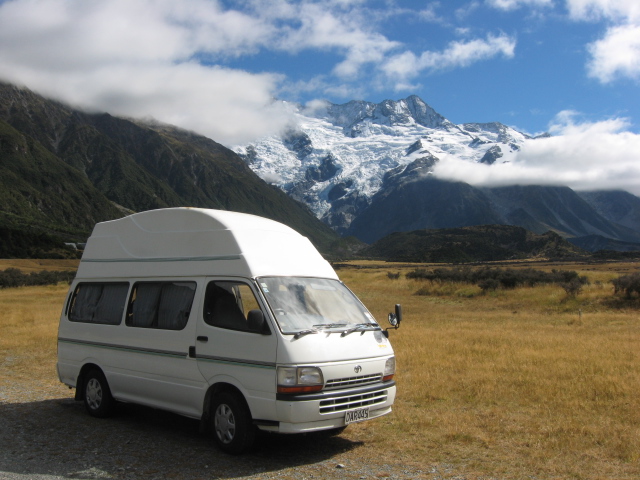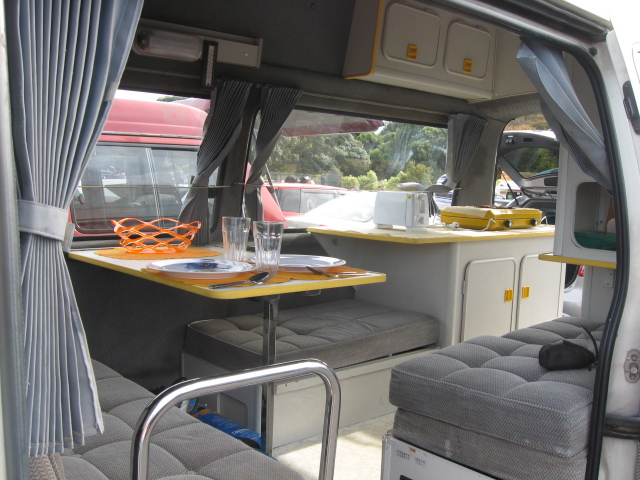
Travel New Zealand
So you are going on vacation in New Zealand! How are you going to travel around and where will you sleep? You have several options:
•Rent a car, sleep in hotels, eat in restaurants (costly)
•Travel by bus and sleep in hostels (cheap but inconvenient)
•Rent a camper van (very expensive)
•Purchase a car with campground, hotel or hostel accommodations (you could buy a very inexpensive car for a few hundred dollars and hope that you don’t have any mechanical problems with it. Many people do this, and most are ok, but you could have bad luck. Anyways, you won’t have a significant investment to lose.)
•Purchase a camper van
Which of these options you choose will depend on how much time you will be spending in the country and your budget. Buying a vehicle is a great option if you have three months or more. I purchased a camper van in New Zealand, travelled around the country for five months, then sold the vehicle and got most of my money back. It worked out great for me, and I had no problems.
Camping or Hotel?
There are advantages and disadvantages to all these options. Staying in hotels and eating in restaurants is nice but expensive, especially in New Zealand. I prefer camping for several reasons:
•It is cheaper than hotels; your vehicle is your home
•You can cook your meals and avoid expensive restaurants
•Meet more people, both local and international travellers
•See more of the outdoors than city life.
Buying a Vehicle in New Zealand
So how do you go about buying a vehicle in New Zealand? Here are the things you need to do:
•Make sure the vehicle is in excellent mechanical condition. Have it inspected at a garage. This should cost you about $150 and is well worth it. Buying a vehicle has some risk. You might get a lemon and have many expensive repairs or worse, the engine or transmission could die and need to be replaced. Choose your garage; not one recommended by the seller. Ask for a record of past maintenance.
•You will need a Warrant of Fitness (WOF). This is a sticker that goes on your vehicle to prove that it is roadworthy. You can get this done at the same time as the mechanical inspection. The WOF includes safety items such as brakes and lights but not the quality of the engine or other parts. The seller should pay for this, but you will pay for the extra mechanical inspection.
•Change the Licence and Registration over to your name. You have seven days to do this at any post office for a small fee.
•Are any Road User Charges (RUC) are owed? RUC is a road tax on diesel vehicles. If your purchase is diesel powered, you must pay this, but you don’t want to pay for past use. Check if any is owing. There should be a sticker for this on the windshield, but you can verify the data at any post office. You also pay these fees there if you need to. Gasoline (called petrol in NZ) does not have road tax but is much more expensive than diesel fuel.
•I was shocked to learn that automobile insurance is not mandatory in NZ. I wonder how many people are driving around without it. If you cause an accident and do not have insurance, you are responsible for paying for the damages. Although it is not required by law, I think you would be foolish to drive without it. Get at least third party insurance for other vehicles. I did not bother getting insurance on my vehicle and took a chance with that.
•Check to make sure there are no outstanding debts on the vehicle and that it has not been stolen. Ask at the post office about this.
•A Warrant of Electrical Fitness (WOEF) for camper vans. The electrical outlets in campgrounds in NZ are not the same as those in a building. You need a special cable and a WOEF. Using electricity in a campground is illegal without this. The seller should pay for it. I did not know about this when I bought my vehicle and ended up paying for it myself as well as some minor electrical repairs.
•Your driver’s licence from your country is good for one year in NZ, so you don’t have to worry about that.
If you are buying the vehicle from a dealer, they will be able to help you with these things or even do them for you.
Where to Purchase a Vehicle in Auckland
Check local auto and RV dealers and the newspapers for vehicles for sale. Some places to search on the internet are:
Bedmobiles http://www.bedmobils.com
Travel Cars NZ http://travelcarsnz.com/
Trademe http://www.trademe.co.nz Trademe is something like eBay but you have to be a NZ resident in order to buy or sell anything. So you can’t buy a vehicle on there but it is a great place to look to see what is available and the prices.
Backpacker’s Car World http://www.backpackercarworld.com/ This is where I bought my vehicle
Ellerslie Car Fair
Don’t worry about buying a vehicle before you go. There is no shortage of used cars and campers for sale. But it is a good idea to study the websites and get a general idea of what to buy, how much to pay and where to buy it.
Selling Your Vehicle
When it comes time to sell the vehicle you have two options: sell it yourself or sell it back to the dealer. Dealer buybacks are very convenient, but you only get about 50% back of what you paid. Selling it yourself will get you a lot more money but takes time. I allowed three weeks to sell my vehicle and then sold it by noon on the first day. This left me without transportation for my last three weeks in NZ. But you never know how long it will take and don’t want to get stuck with it on the day of your flight out. If you are selling back to the dealer you bought it from, you can keep it to the last couple of days.
See my post on Selling a Vehicle in New Zealand
Toyota Hiace
The type of vehicle that I recommend is a Toyota Hiace. This is an excellent little van. The configuration inside could be anything from bare walls with a mattress on the floor to one with custom camping furniture installed. Try to get one with a tall roof so that you can stand up in it without being bent over and also for more storage space. We kept our suitcases up there. The photos are of the one I purchased in New Zealand. Average price for a decent one is about $10,000 NZ dollars.
I bought a vehicle in a foreign country three times now without any problems (in Germany and Australia as well as NZ). It is my preferred method of travel.
Happy Trails.
